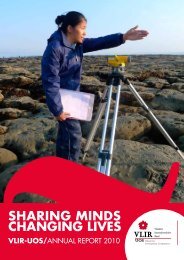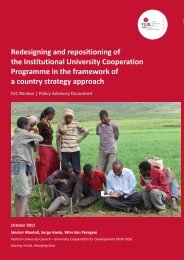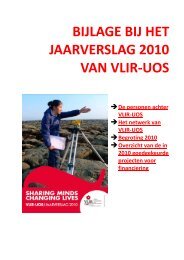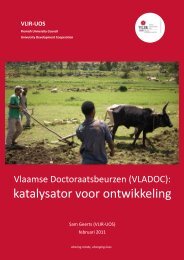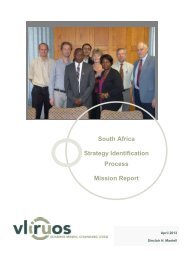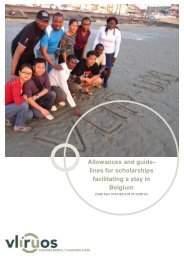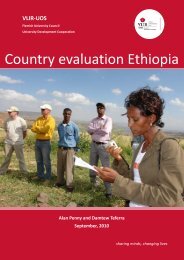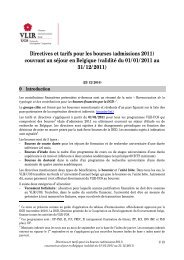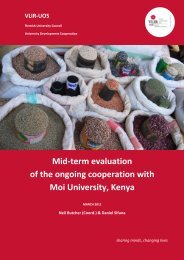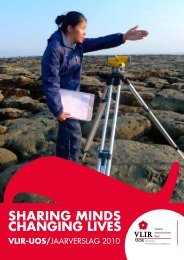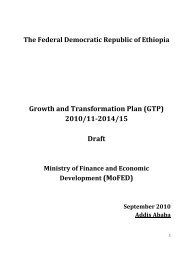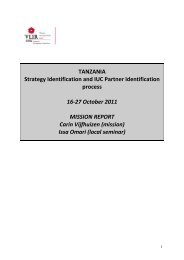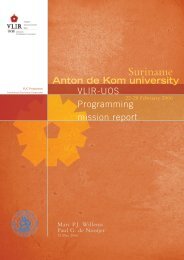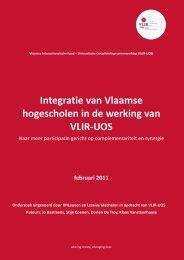Education Sector Development Program - VLIR-UOS
Education Sector Development Program - VLIR-UOS
Education Sector Development Program - VLIR-UOS
You also want an ePaper? Increase the reach of your titles
YUMPU automatically turns print PDFs into web optimized ePapers that Google loves.
<strong>Education</strong> <strong>Sector</strong> <strong>Development</strong> <strong>Program</strong> IV<br />
Strategies and component activities<br />
Indicator/target<br />
Revising and distributing SIP related guidelines and<br />
instruments<br />
Capacity development of SIP support teams in<br />
regional and woreda offices to reinforce their<br />
support to schools with SIP<br />
Giving training to SIP stakeholders at school level<br />
to reinforce their school improvement planning<br />
capacities<br />
Ensuring that SIPs develop strategies to decrease<br />
early drop-out<br />
Number of SIP guidelines and instruments<br />
completed<br />
% of schools with SIP guidelines and instruments<br />
Teaching and learning time will be utilized<br />
100% by both teachers and students through<br />
reducing late coming, truancy and absenteeism<br />
Number of experts in support teams having received<br />
relevant capacity development<br />
Number of SIP stakeholders at school level with<br />
necessary skills to prepare a SIP<br />
% of SIPs which give attention to decrease in dropout<br />
Sub-component: More conducive learning<br />
environment through provision of sufficient<br />
operational funds and enhanced resource<br />
utilization by school and community<br />
Organizing a comprehensive public information<br />
program about the purpose and use of school<br />
grants<br />
Implementing the school grant disbursement<br />
% of schools and ABE centers using school grants<br />
to address priority areas identified in the SIP<br />
Number of public information events organized<br />
% of schools who receive their grants on time<br />
Training school staff in financial management and<br />
in the use of the school grants, through the SGG<br />
Number of school staff with necessary skills in<br />
financial management<br />
Training staff at regional and woreda levels on<br />
support to be given to schools in using school<br />
grants, through the SGG<br />
Number of experts in support teams having received<br />
relevant capacity development<br />
Component 4: Information Communications Technology<br />
Sub-component: Quality of education improved<br />
through the implementation of all ICT components<br />
in secondary schools<br />
Developing and implementing a technology<br />
responsive ICT national curriculum for primary,<br />
secondary and higher education as well as for other<br />
educational institutions<br />
Producing new educational TV programs based on<br />
the revised curriculum<br />
Developing a program for training a critical mass<br />
of computer literacy teachers<br />
% of secondary teachers who are computer literate<br />
will increase by 100%<br />
% of secondary teachers who properly utilize the<br />
satellite TV programs will increase to 100%<br />
% of secondary students who can properly utilize<br />
satellite TV programs will increase to 100%<br />
Curriculum developed<br />
No of new programs produced<br />
100% of secondary school students will have<br />
access to educational TV programs<br />
80% of secondary school teachers will be trained<br />
in computer applications<br />
100% of female secondary school teachers trained<br />
in computer literacy<br />
29



